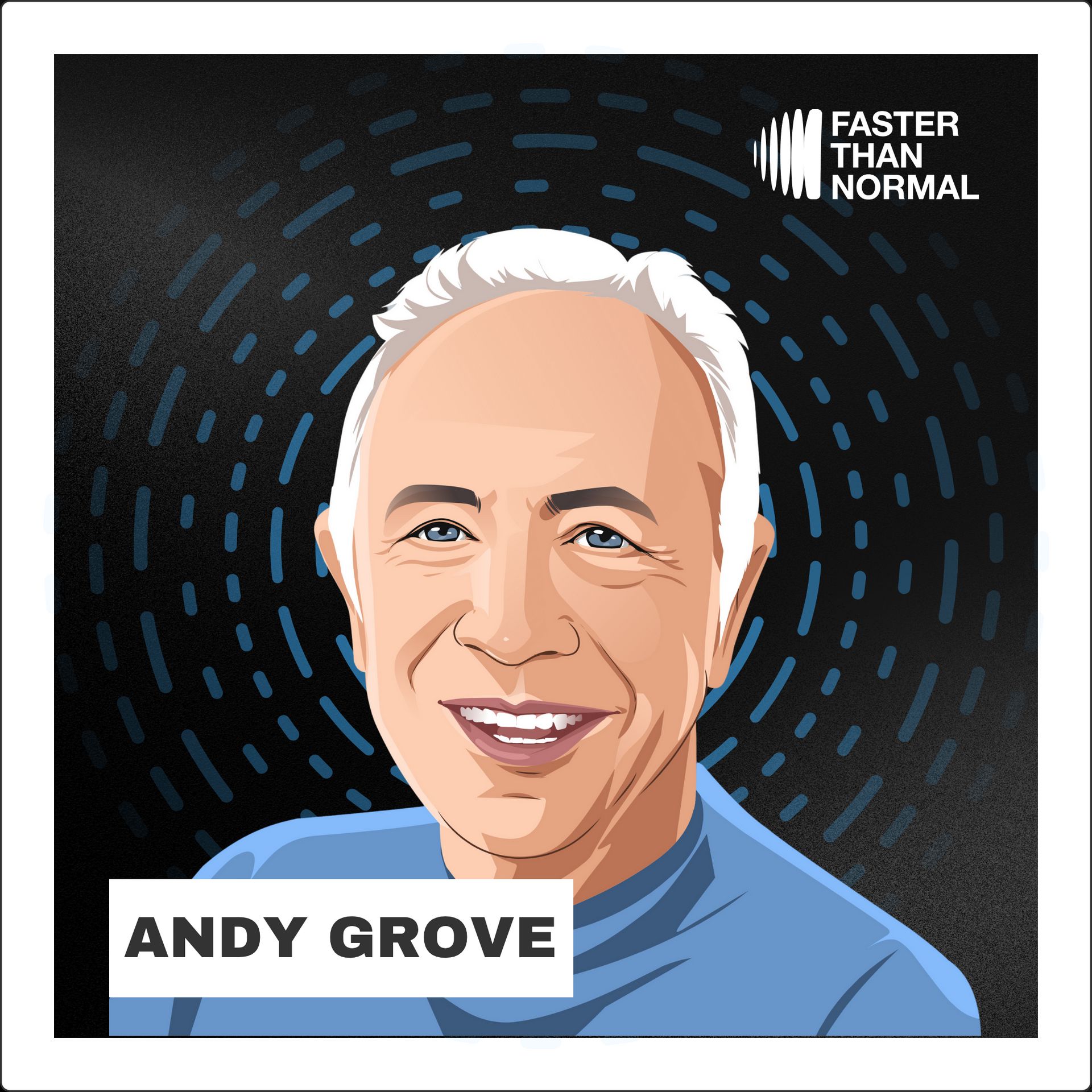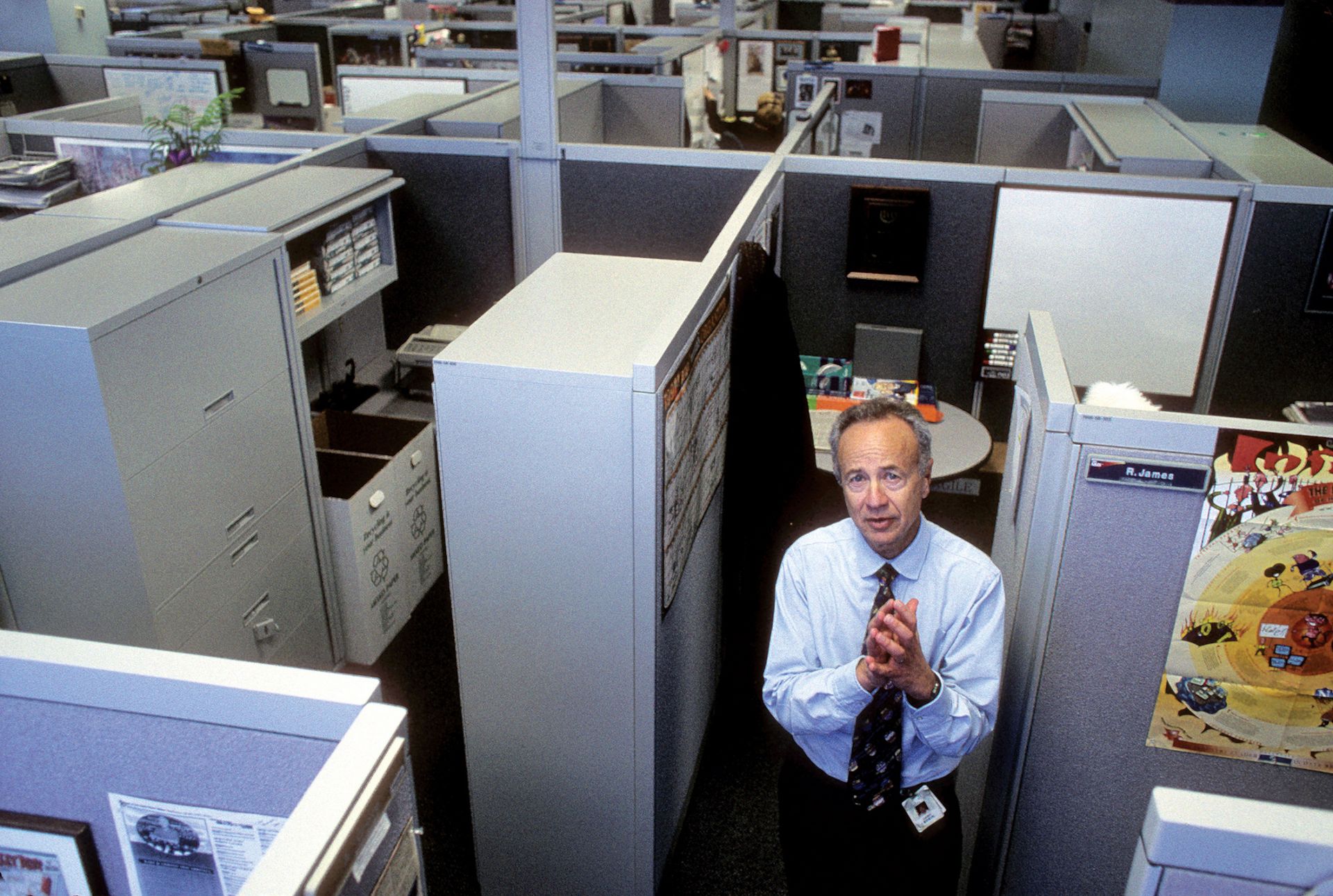August 23, 2025
•
[rtime]
mins
Andy Grove
At a glance

This edition is brought to you by Athyna
Good morning to all new and old readers! Here is your Saturday edition of Faster Than Normal, exploring the stories, ideas, and frameworks of the world’s most prolific people and companies—and how you can apply them to build businesses, wealth, and the most important asset of all: yourself.
Today, we’re covering Andy Grove and his journey from a Hungarian refugee to a Silicon Valley icon who helped shape the modern tech industry and led Intel to global dominance.
If you enjoy this, feel free to forward along to a friend or colleague who might too. First time reading? Sign up here.
What you’ll learn:
How Andy Grove became Silicon Valley’s ultimate strategist
Lessons on embracing paranoia as a strategy, think like an outsider, and build a learning organization
Quotes on lasting advantages, managers, and communication
Cheers,
Alex
P.S. Send me feedback on how we can improve. We want to be worthy of your time. I respond to every email.
Andy Grove

Andy Grove's story is the quintessential American dream. Born András Gróf in Hungary, he grew up amid chaos. Nazis. Communists. As a child, he hid from both. At 20, he fled his homeland during the Soviet invasion, arriving in New York with nothing but determination.
"When I came to Intel, I was scared to death," Grove once said. "I left a very secure job where I knew what I was doing and started running R&D for a brand new venture in untried territory. It was terrifying."
But Grove thrived on challenge. He worked his way through City College, then earned a Ph.D. from Berkeley. Smart. Driven. In 1968, he joined Intel as employee number three. The company had potential, but semiconductors were a risky business.
Grove's opportunity came as Intel shifted from memory chips to microprocessors. He saw the future. PCs. The internet. A connected world. But the transition was brutal. Grove had to lay off thousands. Rebuild the company from scratch. Bet everything on an unproven market.
"Business success contains the seeds of its own destruction," Grove wrote. "Success breeds complacency. Complacency breeds failure. Only the paranoid survive."
His paranoia paid off. Under Grove's leadership, Intel dominated the PC revolution. By 1997, its processors powered 90% of the world's computers. Grove became a Silicon Valley legend. Mentor to Steve Jobs and other tech titans.

But he never lost his hunger. His drive. Pat Gelsinger, former Intel CEO, said: "Probably no one person has had a greater influence in shaping Intel, Silicon Valley, and all we think about today in the technology world than Andy Grove."
Grove's success went beyond Intel. He shaped how Silicon Valley does business. His management style - direct, confrontational, results-driven - became the template for tech companies. "Andy believes in 'strategy by speechmaking,'" said Richard Tedlow, Grove's biographer. "Because he has a sense of history, he often uses analogies from the past to illustrate his points."
Even at the height of his success, Grove remained a student. He taught at Stanford, using his own decisions as case studies. Always learning. Always improving.
"There are waves and then there's a tsunami," Grove wrote. "When a change in how some element of one's business is conducted becomes an order of magnitude larger than what that business is accustomed to, then all bets are off."
Andy Grove rode that tsunami. From refugee to tech pioneer. From outsider to Silicon Valley icon.
Lessons
Lesson 1: Embrace paranoia as a strategy. You might think being paranoid is a weakness. It's not. It's a superpower. Grove knew this. He famously said, "Only the paranoid survive." He wasn't just being cute. He meant it. At Intel, they were always looking over their shoulder. Always expecting the worst. It made them nimble. Ready. When Japanese competitors started eating their lunch in memory chips, Intel was ready to pivot. They moved into microprocessors. Fast. This paranoia saved the company.
Lesson 2: Think like an outsider. Even when you're on top, you need to think like an underdog. Grove did this. He was always imagining how a competitor could beat Intel. He'd ask, "If we got kicked out and the board brought in a new CEO, what would he do?" Then he'd do that. It kept Intel ahead. Innovative. As he put it, "Success breeds complacency. Complacency breeds failure. Only the paranoid survive." Full circle.
Lesson 3: Build a learning organization. Grove was obsessed with learning. Not just for himself. For the whole company. He set up Intel University. Encouraged employees to teach each other. To share knowledge. He believed, "The person who is the star of a previous era is often the last one to adapt to change." So he made sure Intel was always learning. Always adapting.
Lesson 4: Use crisis as a catalyst. Most people see crises as threats. Grove saw them as opportunities. When Intel faced a major issue with its Pentium chip in 1994, Grove didn't hide. He acted. Fast. He offered to replace every faulty chip. It cost $475 million. But it built trust. Loyalty. As Grove put it, "Bad companies are destroyed by crisis. Good companies survive them. Great companies are improved by them."
Lesson 5: Treat time like money. Grove was obsessed with time management. He saw it as the most precious resource. You should too. Be ruthless with your calendar. Cut meetings short. Make decisions fast. As Grove put it, "Just as you would not permit a fellow employee to steal a piece of office equipment, you shouldn't let anyone walk away with the time of his fellow managers."
Hire remote employees with confidence
Two years ago, I hired an offshore assistant , and it’s been one of the best decisions I’ve made. From marketing to customer support, it’s helped streamline work and boost productivity.
Athyna is a service that finds top remote employees in <5 days in Latam, Africa, and Sth East Asia. They cover roles in finance, creative, engineering, and product, sourcing top talent from companies like Google, AWS, Microsoft, and more.
If you’re in the market for talent, visit their website to explore options and cover all your hiring needs.
Andy Grove Quotes
On lasting advantages: "The person who is the star of the previous era is often the last one to adapt to change."
On managers: "The most important role of managers is to create an environment in which people are passionately dedicated to winning in the marketplace."
On strategy: "A strategic inflection point is a time in the life of business when its fundamentals are about to change."
On communication: "How well we communicate is determined not by how well we say things, but how well we are understood."
On time management: "Just as you would not permit a fellow employee to steal a piece of office equipment, you shouldn't let anyone walk away with the time of his fellow managers."
On focus: "To understand a company's strategy, look at what they actually do rather than what they say they will do."
On crises’: "Bad companies are destroyed by crisis. Good companies survive them. Great companies are improved by them."
On leadership: "The art of management lies in the capacity to select from the many activities of seemingly comparable significance the one or two or three that provide leverage well beyond the others and concentrate on them."
On self-improvement: "The biggest competition is myself. I am not looking to follow others or pull them down. I'm planning to test my own boundaries."
Further Readings
Andy Grove: The Life and Times of an American Business Icon by Richard S. Tedlow
The Intel Trinity: How Robert Noyce, Gordon Moore, and Andy Grove Built the World's Most Important Company by Michael S. Malone
Andy Grove: The Life and Times of an American by Richard S. Tedlow (Harvard Business Review article)
That’s all for today, folks. As always, please give me your feedback. Which section is your favourite? What do you want to see more or less of? Other suggestions? Please let me know.
Have a wonderful rest of week, all.
Recommendation Zone
⎯
Hire remote employees with confidence
Two years ago, I hired an offshore assistant for the first time. Since then, I’ve recommended many people do the same. It’s been one of the highest leverage things I’ve done, helping with everything marketing and customer support (for The Intelligence Age) and personal matters and email management.
Athyna is a service that quickly (<5 days!) finds remote employees across 150+ countries for you or your team. They cover roles from sales and marketing to creative and product, and have worked with companies like Facebook, Zoom, Uber, Microsoft, Salesforce, and Amazon.
I’ve personally used Athyna and recommended them to my Brother, Will, who runs a fashion label, and several close friends running their own businesses. To date, they’ve all had very positive experiences.
If you’re in the market for talent, visit their website to explore options and cover all your hiring needs.


Alex Brogan
Find me on X, LinkedIn, YouTube, Instagram, TikTok
Offshore Talent: Where to find the best offshore talent. Powered by Athyna.
Why Faster Than Normal? Our mission is to be a friend to the ambitious, a mentor to the becoming, and a partner to the bold. We achieve this by sharing the stories, ideas, and frameworks of the world's most prolific people and companies—and how you can apply them to build businesses, wealth, and the most important asset of all: yourself.
Faster Than Normal is a ‘state' of being’ rather than an outcome. Outlier performance requires continuous, compounded improvement. We’re your partner on this journey.
Send us your feedback and help us continuously improve our content and achieve our mission. We want to hear from you and respond to everyone.

Interested in reaching Founders, Operators, and Investors like you? To become a Faster Than Normal partner, apply here.
.png)
.png)